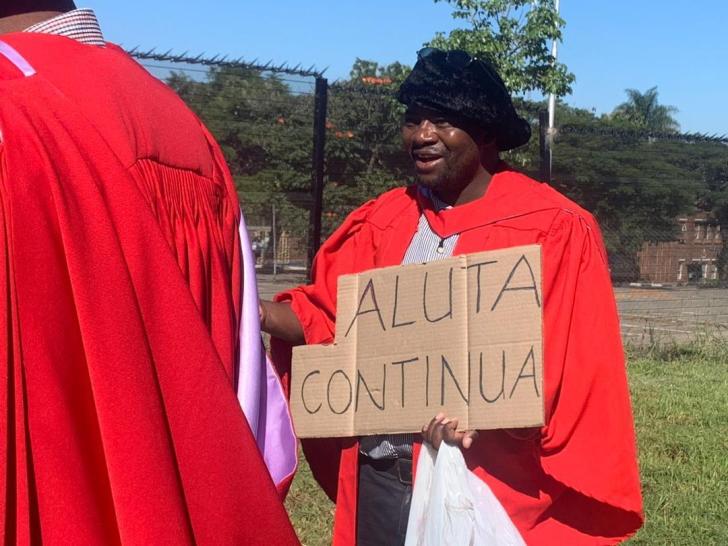News / National
UZ lecturers' strike enters 100 days
24 Jul 2025 at 14:59hrs | Views

Today marks 100 days since lecturers at the University of Zimbabwe (UZ) downed tools in protest against dismal salaries and deteriorating working conditions - an indefinite strike that has paralysed operations at the country's premier institution of higher learning.
The lecturers, represented by the Association of University Teachers (AUT), are demanding urgent government intervention and a return to pre-2018 salary levels. At present, a full professor earns as little as US$230 (approximately R4,000) a month - an amount lecturers describe as "degrading and unsustainable" in light of Zimbabwe's inflation and soaring cost of living. The AUT has been calling for salaries of at least US$2,500 per month.
Despite repeated calls for dialogue, the government and university administration have failed to meaningfully engage with the striking staff. Instead, the response has included suspensions, salary cuts, and the hiring of temporary replacement lecturers, many of whom are allegedly underqualified. The AUT has condemned these actions as “ruthless pressure tactics” designed to break the lecturers' resolve.
The prolonged strike has triggered serious academic disruptions. Students are being subjected to irregular, half-baked lectures from temporary staff. Reports of academic fraud, corruption, and compromised standards have emerged, further undermining the university's credibility.
Under the leadership of Vice-Chancellor Professor Paul Mapfumo - whose 2018 appointment was mired in controversy - UZ has seen a marked decline. Once a beacon of academic excellence in southern Africa, the institution now struggles with mismanagement, suppression of academic freedom, and widespread decay.
The crisis at UZ is reflective of a broader collapse in Zimbabwe's public sector. Education, alongside health, infrastructure, and service delivery, has suffered years of neglect. Many educators have fled the country or left the profession due to poor wages and working conditions. Zimbabwe's teachers and lecturers now rank among the worst-paid professionals in the region, taking home as little as US$200 to US$250 per month.
Infrastructure at the university is in shambles. Lecture theatres and classrooms are overcrowded, buildings are crumbling, and essential resources are lacking. This has led to a decline in teaching quality and research output, dragging UZ down the continental university rankings.
Students have voiced support for the striking lecturers and are pushing back against efforts to normalise the crisis by bringing in replacement staff. Many are demanding urgent reforms and government action to save their education and restore dignity to the country's academic institutions.
As the strike enters its fourth month with no resolution in sight, pressure is mounting on the government and UZ administration to address what has become one of the most visible symbols of Zimbabwe's deepening crisis.
The lecturers, represented by the Association of University Teachers (AUT), are demanding urgent government intervention and a return to pre-2018 salary levels. At present, a full professor earns as little as US$230 (approximately R4,000) a month - an amount lecturers describe as "degrading and unsustainable" in light of Zimbabwe's inflation and soaring cost of living. The AUT has been calling for salaries of at least US$2,500 per month.
Despite repeated calls for dialogue, the government and university administration have failed to meaningfully engage with the striking staff. Instead, the response has included suspensions, salary cuts, and the hiring of temporary replacement lecturers, many of whom are allegedly underqualified. The AUT has condemned these actions as “ruthless pressure tactics” designed to break the lecturers' resolve.
The prolonged strike has triggered serious academic disruptions. Students are being subjected to irregular, half-baked lectures from temporary staff. Reports of academic fraud, corruption, and compromised standards have emerged, further undermining the university's credibility.
Under the leadership of Vice-Chancellor Professor Paul Mapfumo - whose 2018 appointment was mired in controversy - UZ has seen a marked decline. Once a beacon of academic excellence in southern Africa, the institution now struggles with mismanagement, suppression of academic freedom, and widespread decay.
Infrastructure at the university is in shambles. Lecture theatres and classrooms are overcrowded, buildings are crumbling, and essential resources are lacking. This has led to a decline in teaching quality and research output, dragging UZ down the continental university rankings.
Students have voiced support for the striking lecturers and are pushing back against efforts to normalise the crisis by bringing in replacement staff. Many are demanding urgent reforms and government action to save their education and restore dignity to the country's academic institutions.
As the strike enters its fourth month with no resolution in sight, pressure is mounting on the government and UZ administration to address what has become one of the most visible symbols of Zimbabwe's deepening crisis.
Source - online






















